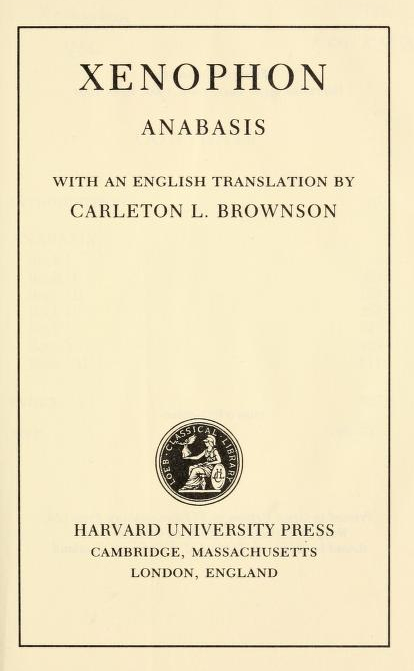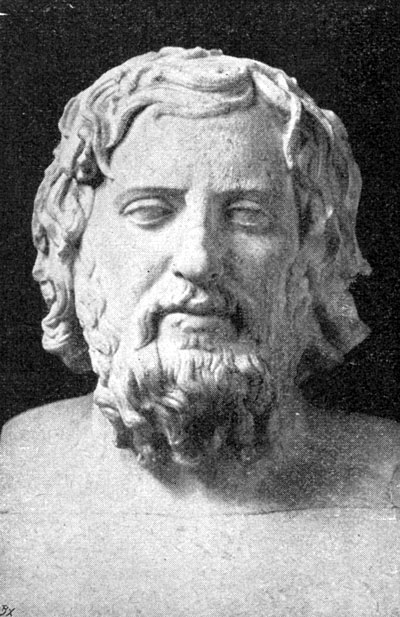|
Arexion
Arexion ( grc, Ἀρηξίων) was a seer (Greek μάντις, one who practices divination). He served under Xenophon with the Ten Thousand in the Persian Expedition recorded by Xenophon in his work ''The Anabasis''. He was the presiding soothsayer during this expedition after Silanos from Ambracia Ambracia (; grc-gre, Ἀμβρακία, occasionally , ''Ampracia'') was a city of ancient Greece on the site of modern Arta. It was captured by the Corinthians in 625 BC and was situated about from the Ambracian Gulf, on a bend of the navigabl ... deserted the army. As a soothsayer he practiced extispicy, the observance of animal entrails to foresee future events. He is also referred to as Arexion the Arcadian (Ἀρηξίων Ἀρκάς) which indicates he was a native of Arcadia, a region in the center of the Peloponnese. Seers were not always mentioned in battle accounts, but they were always present. The Greek army took soothsaying very seriously and would not advance until ... [...More Info...] [...Related Items...] OR: [Wikipedia] [Google] [Baidu] |
Xenophon
Xenophon of Athens (; grc, wikt:Ξενοφῶν, Ξενοφῶν ; – probably 355 or 354 BC) was a Greek military leader, philosopher, and historian, born in Athens. At the age of 30, Xenophon was elected commander of one of the biggest Ancient Greek mercenaries, Greek mercenary armies of the Achaemenid Empire, the Ten Thousand, that marched on and came close to capturing Babylon in 401 BC. As the military historian Theodore Ayrault Dodge wrote, "the centuries since have devised nothing to surpass the genius of this warrior". Xenophon established precedents for many logistical operations, and was among the first to describe strategic flanking maneuvers and feints in combat. Xenophon's ''Anabasis (Xenophon), Anabasis'' recounts his adventures with the Ten Thousand while in the service of Cyrus the Younger, Cyrus's failed campaign to claim the Persian throne from Artaxerxes II of Persia, and the return of Greek mercenaries after Cyrus's death in the Battle of Cunaxa. ''Anabasis ... [...More Info...] [...Related Items...] OR: [Wikipedia] [Google] [Baidu] |
Ten Thousand
The Ten Thousand ( grc, οἱ Μύριοι, ''oi Myrioi'') were a force of mercenary units, mainly Greeks, employed by Cyrus the Younger to attempt to wrest the throne of the Persian Empire from his brother, Artaxerxes II. Their march to the Battle of Cunaxa and back to Greece (401–399 BC) was recorded by Xenophon, one of their leaders, in his work ''Anabasis''. Campaign Between 401 and 399 BC, the Ten Thousand marched across Anatolia, fought the Battle of Cunaxa, and then marched back to Greece. Xenophon stated in ''Anabasis'' that the Greek heavy troops routed their opposition twice at Cunaxa at the cost of only one Greek soldier wounded. Only after the battle did they hear that Cyrus had been killed, making their victory irrelevant and the expedition a failure. The Ten Thousand found themselves far from home with no food, no employer, and no reliable allies. They offered to make their Persian ally Ariaeus king, but he refused on the grounds that he was not of royal bloo ... [...More Info...] [...Related Items...] OR: [Wikipedia] [Google] [Baidu] |
Anabasis (Xenophon)
''Anabasis'' (; grc-gre, Ἀνάβασις ; an "expedition up from") is the most famous work of the Ancient Greek professional soldier and writer Xenophon. It narrates the expedition of a large army of Greek mercenaries hired by Cyrus the Younger to help him seize the throne of Persia from his brother, Artaxerxes II, in 401 BC. The seven books making up the ''Anabasis'' were composed circa 370 BC. Though as an Ancient Greek vocabulary word, ''ᾰ̓νᾰ́βᾰσῐς'' means "embarkation", "ascent" or "mounting up", the title ''Anabasis'' is rendered in translation as ''The March Up Country'' or as ''The March of the Ten Thousand''. The narration of the army's journey across Asia Minor and Mesopotamia is Xenophon's best known work, and "one of the great adventures in human history". Authorship Xenophon, in his '' Hellenica'', did not cover the retreat of Cyrus but instead referred the reader to the ''Anabasis'' by "Themistogenes of Syracuse"—the tenth-century Suda also de ... [...More Info...] [...Related Items...] OR: [Wikipedia] [Google] [Baidu] |
George Cawkwell
George Law Cawkwell (25 October 1919 – 18 February 2019) was a classical scholar who specialised in the ancient history of Greece in the 4th century BC. Life and career Born in Auckland, New Zealand, Cawkwell was educated at King's College, Auckland, and became head boy there. He attended the University of Auckland from 1938, gaining BA and MA degrees. He joined the army in 1942 during World War II and fought with the Fijian Infantry in the Solomons in 1944. Cawkwell was a Rhodes Scholar at Oxford University, studying at Christ Church. He played in the position of lock for the national rugby union team, gaining his cap in 1947. For most of his life, Cawkwell was a Fellow and Praelector in Ancient History of University College, Oxford. He was a Fellow from 1949 to 1987 and then became an Emeritus Fellow. He authored a number of books on ancient history. His students included the classical scholars Ernst Badian and Raphael Sealey. He won the Runciman Award in 1998 for h ... [...More Info...] [...Related Items...] OR: [Wikipedia] [Google] [Baidu] |
Folio Society
The Folio Society is a London-based publisher, founded by Charles Ede in 1947 and incorporated in 1971. Formerly privately owned, it operates as an employee ownership trust since 2021. It produces illustrated hardback editions of classic fiction and non-fiction books, poetry and children's titles. Folio editions feature specially designed bindings and include artist-commissioned illustrations (most often in fiction titles) or researched artworks and photographs (in non-fiction titles). Most editions come with their own slipcase. For many years the Folio Society had a bookshop in Holborn, London, but the bookshop closed in December 2016 when the company moved premises. Folio editions can be purchased only online through their website, by post or over the telephone. Some editions are stocked by independent bookstores, by Blackwell's in Oxford, and by Selfridges, Harrods and Hatchards in London. History The Folio Society was founded in 1947 by Charles Ede, Christopher Sandford ( ... [...More Info...] [...Related Items...] OR: [Wikipedia] [Google] [Baidu] |
Ambracia
Ambracia (; grc-gre, Ἀμβρακία, occasionally , ''Ampracia'') was a city of ancient Greece on the site of modern Arta. It was captured by the Corinthians in 625 BC and was situated about from the Ambracian Gulf, on a bend of the navigable river Arachthos (or Aratthus), in the midst of a fertile wooded plain. History Ambracia was founded between 650 and 625 BC by Gorgus, son of the Corinthian tyrant Cypselus, at which time its economy was based on farmlands, fishing, timber for shipbuilding, and the exportation of the produce of Epirus. After the expulsion of Gorgus's son Periander its government developed into a strong democracy. The early policy of Ambracia was determined by its loyalty to Corinth (for which it probably served as an entrepot in the Epirus trade), and its consequent aversion to Corcyra (as Ambracia participated on the Corinthian side at the Battle of Sybota, which took place in 433 BC between the rebellious Corinthian colony of Corcyra (modern Corfu) and ... [...More Info...] [...Related Items...] OR: [Wikipedia] [Google] [Baidu] |
Arcadia (region)
Arcadia ( el, Ἀρκαδία) is a region in the central Peloponnese. It takes its name from the mythological character Arcas, and in Greek mythology it was the home of the gods Hermes and Pan. In European Renaissance arts, Arcadia was celebrated as an unspoiled, harmonious wilderness; as such, it was referenced in popular culture. The modern regional unit of the same name more or less overlaps with the historical region, but is slightly larger. History Arcadia was gradually linked in a loose confederation that included all the Arcadian towns and was named League of the Arcadians. In the 7th century BC, it successfully faced the threat of Sparta and the Arcadians managed to maintain their independence. They participated in the Persian Wars alongside other Greeks by sending forces to Thermopylae and Plataea. During the Peloponnesian War, Arcadia allied with Sparta and Corinth. In the following years, during the period of the Hegemony of Thebes, the Theban general Epaminond ... [...More Info...] [...Related Items...] OR: [Wikipedia] [Google] [Baidu] |
Calpe (Bithynia)
Calpe ( grc, Κάλπη, Kalpē), also Kalpas or Calpas, was a port city of ancient Bithynia in Asia Minor, on the shore of the Black Sea. It was located not far from the mouth of the river Calpas (modern Ilaflı Dere). It was mentioned in Xenophon's ''Anabasis''. Xenophon, who passed through the place on his retreat with the Ten Thousand, describes it as about halfway between Byzantium and Heraclea Pontica on a promontory, part which projects into the sea is an abrupt precipice. The neck which connects the promontory with the mainland is only wide. The port is under the rock to the west, and has a beach; and close to the sea there is a source of fresh water. The place is minutely described by Xenophon. The place is mentioned also by Pliny the Elder, Solinus, Arrian, who places it 210 stadia Stadia may refer to: * One of the plurals of stadium, along with "stadiums" * The plural of stadion, an ancient Greek unit of distance, which equals to 600 Greek feet (''podes''). * S ... [...More Info...] [...Related Items...] OR: [Wikipedia] [Google] [Baidu] |
Ancient Greek Seers
Ancient history is a time period from the beginning of writing and recorded human history to as far as late antiquity. The span of recorded history is roughly 5,000 years, beginning with the Sumerian cuneiform script. Ancient history covers all continents inhabited by humans in the period 3000 BCAD 500. The three-age system periodizes ancient history into the Stone Age, the Bronze Age, and the Iron Age, with recorded history generally considered to begin with the Bronze Age. The start and end of the three ages varies between world regions. In many regions the Bronze Age is generally considered to begin a few centuries prior to 3000 BC, while the end of the Iron Age varies from the early first millennium BC in some regions to the late first millennium AD in others. During the time period of ancient history, the world population was already exponentially increasing due to the Neolithic Revolution, which was in full progress. While in 10,000 BC, the world population stood ... [...More Info...] [...Related Items...] OR: [Wikipedia] [Google] [Baidu] |






